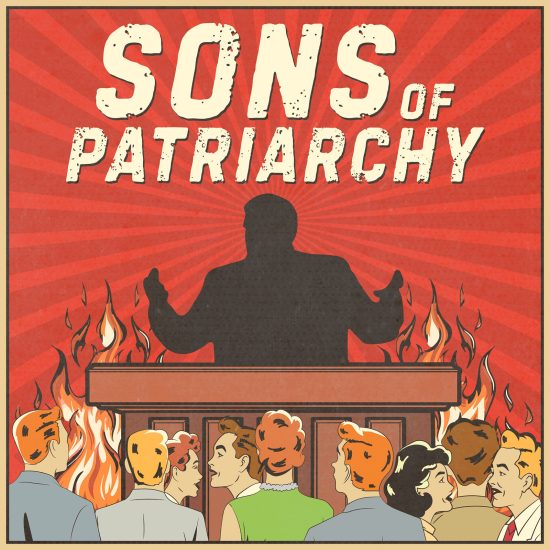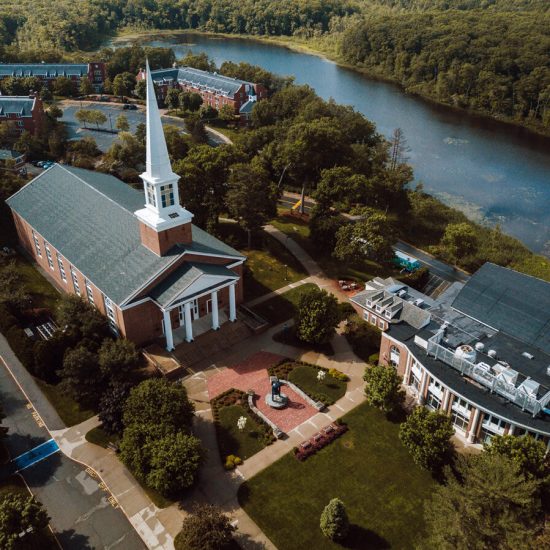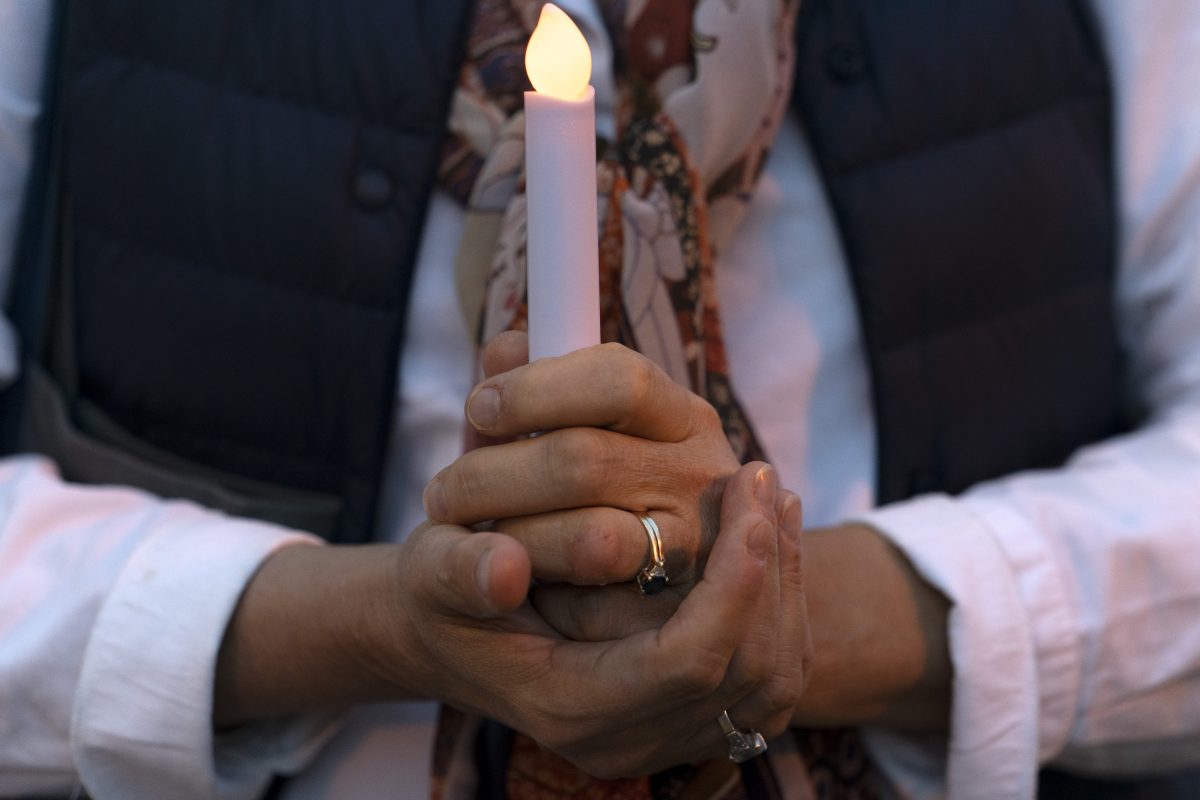
(RNS) — Dwight Lee Wolter, pastor of the historic Congregational Church of Patchogue, New York, had been trying to come up with the most appropriate way to mark All Saints’ Day this year as the country copes with the continuing coronavirus pandemic. A couple of weeks ago, he woke up in the middle of the night and thought, “Oh, my God, we have a bell,” thinking of his church’s 19th-century sandstone, five-story bell tower.
“It was like, ‘Ring the bell once for each life lost in America,’” he said.
Since Oct. 18, a recording of the 160-year-old, 850-pound bell at Wolter’s Long Island church has tolled every six seconds to remember more than 217,000 COVID-19 deaths that had occurred by mid-October. It will continue through All Saints’ Day on Nov. 1.
After Wolter calculated the length of each chime, he worked with sound engineers to record the bell’s sound. A digital recording is now being played through speakers at the height of the actual bell, at normal volume during the day and a reduced level at night.
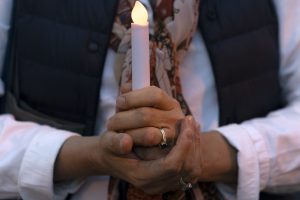
Amy Sommers, of Seattle, prays while attending the “Mourning Into Unity” vigil on Oct. 19, 2020, on the section of 16th Street that has been renamed Black Lives Matter Plaza, near the White House in Washington. (Jacquelyn Martin/Associated Press)
The church’s remembrance joins with other vigils and services planned around All Saints’ Day, the traditional Christian day of remembrance. The various services are remembering people who have died in the past year for any number of reasons and people who have died from COVID-19 whether they are from their congregation or beyond it.
First United Methodist Church of Beaumont, Texas, has delivered candles to the families of the six congregants who died in the last year and invited members to submit names of people they wanted to remember, said Julius Wardley, the church’s pastor of discipleship. Wardley sees the church’s remembrances as a way for the church to meet its congregants’ need for community in a time when social distancing has made grieving particularly challenging for clergy and their flocks.
For that reason, First United Methodist wants to recognize the difficulties beyond its congregation and beyond the pandemic. Lighting candles, tolling a large bell, and ringing smaller handbells at the prerecorded 11 o’clock service will be streamed on Facebook and YouTube to honor those who have died in the pandemic in their county, state, nation and world.
Wardley said they also plan to talk about “the many people who have died due to systemic injustice and then ring the bells again,” and then after that, they “will move into the hymn ‘For All the Saints.’” The church also has sent care packages containing snacks and Chick-fil-A gift cards to college students and provided 700 Halloween gift bags to a local elementary school, Wardley said.
“The church’s job is to be relevant, and so this is an issue that affects us all,” he said of working to keep people connected and encouraged during the pandemic. “We have to be talking about those relevant issues that are happening to our community.”
While All Saints’ Day has become a focus of remembrance, some churches have already been recognizing the extraordinary frequency of deaths during the pandemic. Washington National Cathedral in the District of Columbia has held virtual Saturday services since Memorial Day to honor victims of the pandemic, including more than 2,000 names submitted via a webpage.
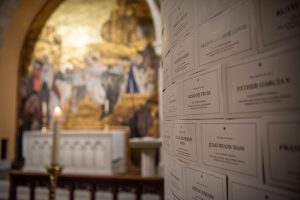
The names of more than 2,000 victims of COVID-19 are displayed in the Chapel of St. Joseph of Arimathea in the crypt of Washington National Cathedral as part of the Cathedral’s weekly COVID memorial services. (Danielle E. Thomas / Washington National Cathedral)
“We will continue the services for as long as people keep sending us names,” said Kevin Eckstrom, chief communications officer of the cathedral, which is also livestreaming an All Saints’ Day prayer service that will include the pandemic among its petitions for healing. “It’s part of our effort to be a place for the nation to mourn the lives lost to the pandemic since there has been no real nationwide effort to express the loss from the pandemic.”
In September, the cathedral tolled its largest bell 200 times — once for each 1,000 COVID-19 deaths in the United States at the time. There are tentative plans to similarly mark 300,000, Eckstrom said.
Other groups have held special liturgies of lament online. The National Council of Churches closed a mid-October Christian Unity Gathering with a memorial service that remembered those who have died, those who are grieving and those who have lost access to homes, food, and employment in the pandemic’s wake.
“Our God of compassion, our God of all comfort, we thank you that you comfort us in all our troubles,” prayed Kirsten Oh, a professor of practical theology at Azusa Pacific University in California, during the virtual Oct. 13 service. “We turn to you in these challenging days of uncertainty, anxiety, loneliness, and fear.”
In recent weeks, 31 Christian, Jewish, and Muslim houses of worship joined an initiative called “Mourning Into Unity,” holding online vigils and in-person processions focused on “naming our loss” and “naming our hope,” said one organizer, Russell Meyer. Though originally planned only for October, other vigils are expected to take place through Election Day and beyond it, said co-founder Mary Claude Foster.
Meyer, an Evangelical Lutheran Church in America minister, said the bipartisan efforts have brought together religious and health professionals at a time of political division and when many people of faith are experiencing or worrying about violence.
“Where we are politically right now is the outcome of not being able to grieve together,” said Meyer, the executive director of the Florida Council of Churches, who said organizers of the initiative had picked a politically neutral color for its processional banners. “We chose purple for a reason.”
Wolter, the Long Island pastor, said he was thinking of All Saints’ Day and not the election when he felt inspired to start the ringing of his church’s bell for two weeks. But as news of his plans spread, he faced deep divisions over them. Though there were “vastly” more positive responses, Wolter said, he received a physical threat from someone who wanted to “ring the neck of the bell ringer.”
“That was another thing that came to me in my God moment in the middle of the night: The bell has no words,” he said. “This will transcend dogma, denomination, religion, politics organization, institution. It will transcend election.”
Some, it appears, seemed to agree: People have driven to the church and paused to listen, including a woman behind the wheel of a Jeep.
“She rolled down the window,” said Wolter of the woman who stopped by when he was standing outside his church, “and said, ‘Thank you so much. It was so meaningful.’”




